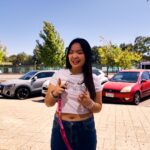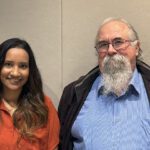Bruno has travelled around the world for his studies – from Mexico to Vienna. Now in Australia, he is pushing the boundaries of Virtual Reality (VR) in science education – specifically, how students collaborate in the chemistry classroom.
Ricardo (Bruno) Hernandez-Alvarado is completing a PhD at the School of Education, co-supervised by Curtin’s Professor David Treagust and Professor Mauro Mocerino, and Monash University’s Associate Professor Mihye Won. Bruno and David reflect on VR in education, the project achievements so far and what you need to build a solid researcher-supervisor relationship.
Bruno:
I started my journey as a researcher during my undergraduate studies in Mexico, majoring in chemistry and minoring in pharmacy and microbiology. It was during that time that I participated in several research internships to understand how things work in academia. For my master, I used computer simulations of molecular components to understand how interaction between proteins and small compounds can produce a biological response. I then started a PhD in pharmacy, but I soon realised my passion was in education.
I wanted to help people use visuals to understand abstract concepts, so I applied to an advertised PhD project here at Curtin. I felt that I could contribute to the research community, grow in the team and most importantly, follow my passion for science education.
My research project revolves around the use of technology to help improve students’ science learning. More precisely, I’m using immersive VR to help students learn chemistry. My project is part of an Australian Research Council (ARC) grant, which aims to understand how we can use the unique affordances of this technology to enhance students’ learning within these environments. We’re interested to know how students understand intermolecular interactions and how those intermolecular interactions can produce a physical observable phenomenon.
VR allows this kind of flexibility where you can start from very small interactions and continue growing the complexity to something that you can observe in physical reality. Right now, most of the available VR experiences for science learning are designed for individual learners.
What I hope to do is show how researchers and educators can effectively implement collaboration into the practice of VR for science education.
When I started in early 2023, the project was initially led by Associate Professor Mihye Won, however she moved to Monash University in my first year as a PhD candidate. At the beginning, my interactions with her were quite frequent and intense – and I was used to her style and level of work. So, when I shifted to another way of working with David, the transition was quite challenging because he had a completely different style of working.
The great thing about David is that he is always very helpful in providing feedback on research, writing and thinking. From our meetings and interactions, he has shown me to always consider my research questions and how the things that I’m observing contribute to these research questions. He’s a very research-oriented person, which helps keep my feet on the ground. He always emphasises making things simple to understand and clear.
One of the greatest achievements that has come from the research project has been an analysis of what an effective collaboration process looks like in VR. We were not only able to identify the key factors that contributed to a successful collaboration, but we also managed to describe these factors in the context of chemistry learning. I have also been able to participate in the Fame Lab contest that is held yearly by the Forest Research Foundation, as well as the Falling Walls Lab, which is an interdisciplinary pitch competition and networking forum. They were both fantastic experiences. Additionally, this year I contributed to one publication as a co-author.
Before starting this PhD journey, I was more like a natural science researcher, so I used to be more in the lab or doing computational simulations, which is mostly quantitative data. Now that I have shifted to educational research, I’ve had to dive into the good practices of social science research, which is collecting and analysing qualitative data, like interviews and questionnaires. Making this shift has contributed a lot to my perspective, my research profile and how I address problems, which has made me a better researcher.
David:
Mihye had advertised a PhD position in 2022, and she was very diligent about who was to be a recipient. Bruno was one of the applicants. We were very impressed with his strong chemistry knowledge, his interest in chemical education and his international orientation. Part of his master’s degree at the University of Mexico was conducted in the United States, so we knew he was a person who was willing to travel. I recall we interviewed him twice and, on each occasion, we were all in different times zones. The beauty of the Internet!
My style as a supervisor is to first ensure that the student’s concept of the research task is clearly focused with definite goals in mind. With the prerequisites decided and agreed upon, the student will then be able to manage the research project with minimal interventions and seek advice as needed. Initially, a lot of work from me and Mihye went into the project to make sure that the focus of the study was clear so that Bruno could run with it. However, problems always arise, that even I don’t have an answer to, and then it’s a problem that we share.
One of the things I’ve learned from Bruno is how he has carefully adapted his interview schedule so that he can accommodate students engaged in these VR tasks. The interviews flow smoothly and mostly on time. He’s very calm and patient.
I’ve been supervising doctoral students for a long time, and what I’ve learnt is that the student and supervisor need a tight working relationship. You need a relationship where the supervisor is comfortable to say be sure that this works, if it doesn’t, let ‘s discuss and see what adjustments are needed. A supervisor also needs to build social rapport with the student. It’s important because the student is essentially becoming part of a community of academics – social rapport is needed for building networks and academic relationships.
About the researchers

Bruno Hernandez-Alvarado
Bruno is a PhD candidate supervised by Prof. David Treagust, A/Prof. Mihye Won and Prof. Mauro Mocerino. His research project aims to unveil how students interact with other students to learn science in immersive virtual reality (iVR) and what are the main pros and cons of having a peer throughout iVR learning experiences.

Professor David F Treagust
David is a John Curtin Distinguished Professor in the School of Education. Prior to graduate studies at the University of Iowa, USA, he taught high school science and chemistry for 10 years. He supervises research students on students’ understanding of science concepts and how these understandings can be accommodated in teachers’ classroom practices.



